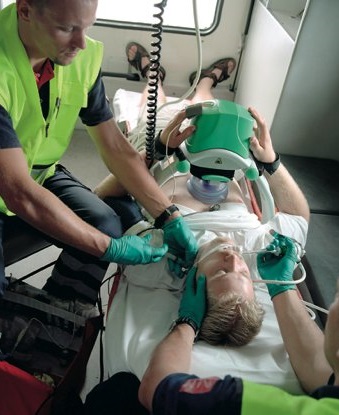Humans still match-up in CPR stakes
 Swedish medical researchers have conducted a study to compare automatic and manual cardiopulmonary resuscitation (CPR) techniques, to see which has the best survival results.
Swedish medical researchers have conducted a study to compare automatic and manual cardiopulmonary resuscitation (CPR) techniques, to see which has the best survival results.
The test sought to prove whether recent developments in automatic chest compression machines have pushed them beyond human capability.
Automatic CPR devices generally sit on top of the thorax and provide repeated compressions with a large suction-cup-shaped attachment.
“Many factors affect the chances of survival after cardiac arrest, including early recognition of arrest, effective CPR and defibrillation, and post-resuscitation care. One important link is the delivery of high-quality chest compressions to achieve restoration of spontaneous circulation,” the new study says.
“The effectiveness of manual chest compressions depends on the endurance and skills of rescuers, and manual compressions provide only approximately 30 percent of normal cardiac output. Manual CPR is also limited by prolonged hands-off time, and its quality is particularly poor when it is administered during patient transport. Mechanical chest compression devices have therefore been developed to improve CPR,” according to background information in the article.
“A strategy using mechanical chest compressions might improve the poor outcome in out-of-hospital cardiac arrest, but such a strategy has not been tested in large clinical trials.”
And so, a large clinical trial was conducted.
In clinical trials on 2,589 patients with out-of-hospital cardiac arrest, conducted between January 2008 and February 2013, were undertaken by 4 Swedish, 1 British, and 1 Dutch ambulance services.
1,300 patients received chest compressions from a mechanical device combined with defibrillation during the compressions, while 1289 received manual CPR according to guidelines. Follow-ups were conducted after 6 months.
Four-hour survival was achieved in 307 patients (23.6 per cent) with mechanical CPR and 305 (23.7 per cent) with manual CPR.
Among patients surviving at 6 months, 99 percent in the mechanical CPR group and 94 percent in the manual CPR group had good neurological outcomes.
“In patients with out-of-hospital cardiac arrest, mechanical chest compressions in combination with defibrillation during ongoing compressions provided no improved 4-hour survival vs. manual CPR according to guidelines. There was a good neurological outcome in the vast majority of survivors in both groups, and neurological outcomes improved over time,” the authors write.
More details will be available in the next edition of the Journal of the American Medical Association.








 Print
Print